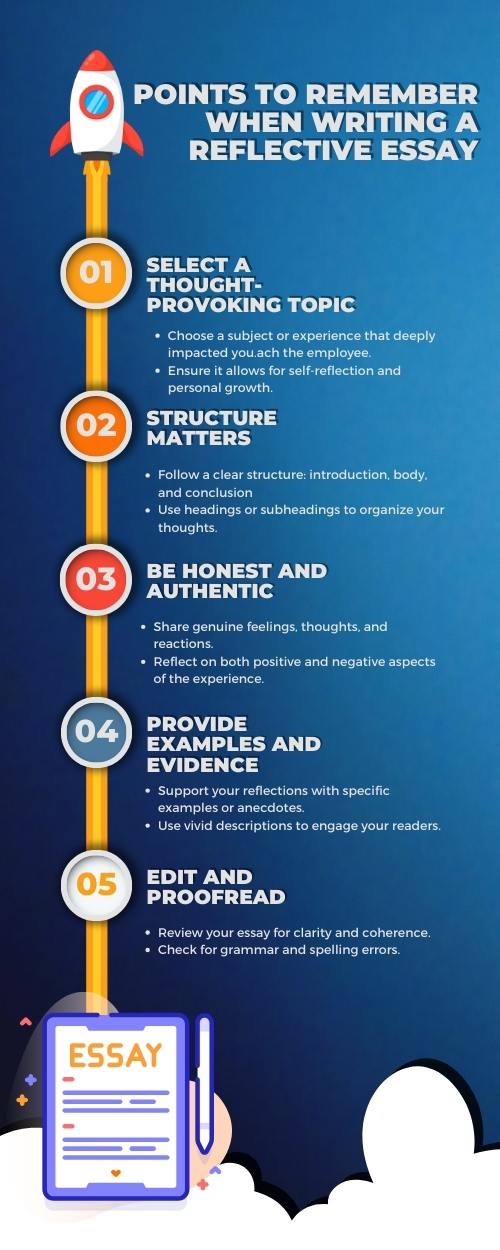
Listen To This Blog
What is a Reflective Essay?
A reflective essay is a unique genre of academic writing that goes beyond mere factual reporting or analysis. Its purpose is to encourage individuals to introspect, examine their experiences, thoughts, and emotions, and then articulate their newfound insights in a coherent narrative. This self-exploration process allows writers to not only deepen their understanding of a particular subject or life event but also refine their critical thinking and communication skills. The importance of reflective essays lies in their ability to foster self-awareness, personal growth, and the development of empathy. Moreover, they have gained increasing relevance in today's education landscape as institutions prioritize holistic learning experiences that extend beyond rote memorization. In an era where essay writing services are prevalent, reflective essays cannot be outsourced; they require genuine personal engagement, making them an invaluable tool for self-expression and learning.
Pro Tips for Writing a Reflective Essay: Proper Reflective Essay Outline
In the realm of academic writing, mastering the art of composing a reflective essay is a significant milestone. It provides a unique opportunity for personal growth and critical thinking. However, success begins with a crucial step: creating a reflective essay outline. In this guide, we'll explore pro tips for structuring your reflective essay template. By the end, you'll have the tools to craft compelling narratives that captivate your audience. Let's dive into the secrets of a proper reflective essay outline.
Introduction to Reflective Essays
Reflective essay help offer a unique platform for individuals to delve into their thoughts, experiences, and emotions, providing readers with personal insights and valuable life lessons. These essays encourage introspection and self-expression, making them a powerful tool for self-discovery and growth. Here's a brief overview:
- Reflective essays enable writers to explore their inner thoughts and feelings.
- They often involve recounting personal experiences and reflecting on their significance.
- These essays promote critical thinking and self-awareness.
- Readers gain a deeper understanding of the writer's perspective and lessons learned.
- Reflective essays are commonly assigned in educational settings to encourage students' self-reflection and communication skills.
Unpacking the Core of a Reflective Essay: The Body Paragraphs
In the body paragraphs of a reflective essay, you have the opportunity to delve deeper into your experiences and insights. Each paragraph should focus on a specific aspect of your reflection, providing clarity and depth to your narrative. Here's what to keep in mind:
- Topic Sentences: Start each body paragraph with a clear topic sentence that introduces the main point or idea you'll discuss.
- Supporting Details: Provide concrete examples, evidence, or anecdotes from your experiences to support your reflection.
- Personal Analysis: Reflect on these experiences by analyzing what you learned, how they impacted you, or any changes in your perspective.
- Transitions: Use transitional phrases to ensure a smooth flow between paragraphs and ideas.
- Organization: Arrange your body paragraphs logically, following a chronological order or thematic progression, depending on your essay's focus.
- Depth and Insight: Aim to explore your thoughts and feelings thoroughly, offering readers a profound understanding of your journey.
Conclusion of Reflective Essays
In the reflective essay conclusion, the writer should aim to provide a thoughtful summary of their experiences and insights while leaving a lasting impression on the reader. It's a chance to reinforce the key takeaways and lessons learned throughout the essay. Here's how to approach it:
- Reiterate the Main Points: Summarize the main themes or experiences discussed in the essay.
- Reflect on Personal Growth: Highlight personal growth, changes, or newfound perspectives resulting from the experiences.
- Emphasize the Significance: Explain why the experiences are meaningful or how they have influenced your thinking.
- Offer Future Considerations: Suggest how these insights might impact future decisions or actions.
- End with Impact: Craft a memorable closing statement or thought-provoking question to leave the reader with something to ponder.
Comprehending the Reflection Paper Format
Reflective essays have a different format than argumentative or research papers. They are more like well-structured stories or diary entries, full of insights and reflections. You may be required to format your essay in APA or MLA style.
Reflection papers are typically 300-700 words long, but check with your instructor for specific requirements. Even though the essay is about you, avoid using too much informal language.
APA and MLA Reflective Essay Formatting Shortcuts
If your instructor asks you to format your reflective essay in APA or MLA style, here are a few shortcuts:
How to Format a Reflective Essay in MLA Style
- Use Times New Roman 12pt font, double-spaced, with 1" margins.
- Include your last name and the page number in the top right corner of every page.
- Center your titles.
- Include a header at the top of every page with your name, professor's name, course number, and the date.
- Include a Works Cited page at the end of your essay.
How to Format a Reflective Essay in APA Style:
- Use Times New Roman 12pt font, double-spaced, with 1" margins.
- Include a page header at the top of every page with your page number on the right.
- Divide your essay into four sections: Title Page, Abstract, Main Body, and References.
Characteristics of Reflective Essay:
A reflective essay has several characteristics that are worth discussing because it helps in the better understanding of the concept of a reflective essay. Below are mentioned the few characteristics that properly define a reflective essay:
- Personal Experience: Personal experiences serve as the foundation of reflective essays. Reflecting on an important event, personal development, trying circumstances, or life-changing experience is a common choice for writers.
- Self-Analysis: The essay should go into detail on the writer's feelings, thoughts, and responses to the experience. It should examine the impact the experience had on the author and how that influenced or changed him or her personally.
- Critical Thinking: Critical reflection on their experiences is recommended for writers. This can entail challenging presumptions, assessing the importance of the event, and taking wider ramifications into account.
- Structure: While the format of a reflective essay may change, it usually consists of an introduction that sets the scene for the reflection, a body that presents the reflection, and a conclusion that highlights the most important realisations and lessons.
- Learning Growth: Reflective writing frequently emphasises learning and personal development. Writers may talk about what they took away from the event and how it changed their outlook or how they would behave in the future.
Advice for Writing a Reflective Essay

Reflective essays are a great way to explore your thoughts and feelings about a particular topic or experience. They can also be a valuable tool for learning and growth. Here are a tips for writing a reflective essay:
- Choose a meaningful topic : The best reflective essays are written about topics that are personally meaningful to you. This could be an experience that you have had, a person who has influenced you, or a book or article that has made you think.
- Be honest and open : Reflective essays are most effective when you are honest about your thoughts and feelings. Be vulnerable and share your stories, both good and bad.
- Be specific : Don't just make general statements about your topic. Instead of making general statements, provide specific examples and details to back them up.
- Be reflective: The goal of a reflective essay is to learn from your experiences. Take some time to think about what you have learned from your topic and how you can apply those lessons to the future.
Here are some additional tips:
- Engage in idea generation: Prior to commencing the writing process, allocate some time to brainstorm your thoughts. What key messages do you wish to convey about your subject? What are the primary arguments or points you intend to emphasize?
- Organize your thoughts : Once you have a good understanding of your topic and what you want to say, take some time to organize your thoughts. This will help you to write a clear and well-structured essay.
- Write a draft : Don't worry about making your first draft perfect. You can go back and edit later.
- Revise and edit. Once you have finished writing your draft, take some time to revise and edit your work. Make sure that your essay is well-organized, well-written, and free of errors.
Thought-Provoking Topics for Reflective Essays
Reflective essays are a great way to explore your thoughts and feelings about a particular topic or experience. They can also be a valuable tool for learning and growth. Here are a few thought-provoking topics for reflective essays:
- An experience that has changed your perspective on the world
- A book or article that has made you think deeply
- A current event or social issue that you are passionate about
Here are some additional ideas:
- A time when you made a mistake and what you learned from it
- A time when you learned something new and important
- A time when you experienced a strong emotion, such as joy, sadness, or anger, and how you coped with it
When choosing a topic for your reflective essay, it is important to choose that is meaningful . This will help you to write a more honest and insightful essay.
How to Write a Strong Conclusion for Your Reflective Essay
The conclusion of your reflective essay is your chance to leave a lasting impression on your reader. It is also your opportunity to summarize your main points and restate your thesis statement.
Here are a few writing tips for a strong conclusion:
- Summarize your main points. Briefly summarize the main points of your essay. This will help your reader to remember what you have said and to understand your overall argument.
- Restate your thesis statement. Your thesis statement is the main point of your essay. Restating your thesis statement in the conclusion will help to reinforce your argument and leave a strong impression on your reader.
- End with a call to action. Encourage your reader to think about the topic of your essay or to take action in some way. For example, you could ask them to write a reflective essay of their own, to research the topic further, or to take action to help others.

